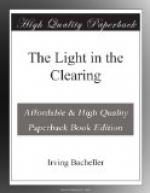After I ceased to play with the Wills boy Uncle Peabody used to say, often, it was a pity that I hadn’t somebody of my own age for company. Every day I felt sorry that the Wills boy had turned out so badly, and I doubt not the cat and the shepherd dog and the chickens and Uncle Peabody also regretted his failures, especially the dog and Uncle Peabody, who bore all sorts of indignities for my sake.
In the circumstances I had to give a good deal of time to the proper education of my uncle. Naturally he preferred to waste his time with shovels and rakes. But he soon learned how to roll a hoop and play tag and ball and yard off and how to run like a horse when I sat on his shoulders. It was rather hard on him, after his work in the fields, but he felt his responsibility and applied himself with due diligence and became a very promising child. I also gave strict attention to his talent for story-telling. It improved rapidly. Being frank in my criticism he was able to profit by all his failures in taste and method, so that each story had a fierce bear in it and a fair amount of growling by and by. But I could not teach him to sing, and it was a great sorrow to me. I often tried and he tried, but I saw that it wasn’t going to pay. He couldn’t make the right kind of a noise. Through all this I did not neglect his morals. If he said an improper word—and I regret to say that he did now and then—I promptly corrected him and reported his conduct to Aunt Deel, and if she was inclined to be too severe I took his part and, now and then, got snapped on the forehead for the vigor of my defense. On the whole it is no wonder that Uncle Peabody wearied of his schooling.
One day when Uncle Peabody went for the mail he brought Amos Grimshaw to visit me. I had not seen him since the day he was eating doughnuts in the village with his father. He was four years older than I—a freckled, red-haired boy with a large mouth and thin lips. He wore a silver watch and chain, which strongly recommended him in my view and enabled me to endure his air of condescension.
He let me feel it and look it all over and I slyly touched the chain with my tongue just to see if it had any taste to it, and Amos told me that his grandfather had given it to him and that it always kept him “kind o’ scairt.”
“Why?”
“For fear I’ll break er lose it an’ git licked,” he answered.
We went and sat down on the hay together, and I showed him the pennies I had saved and he showed me where his father had cut his leg that morning with a blue beech rod.
“Don’t you ever git licked?” he asked.
“No,” I answered.
“I guess that’s because you ain’t got any father,” he answered. “I wish I hadn’t. There’s nobody so mean as a father. Mine makes me work every day an’ never gives me a penny an’ licks me whenever I do anything that I want to. I’ve made up my mind to run away from home.”




